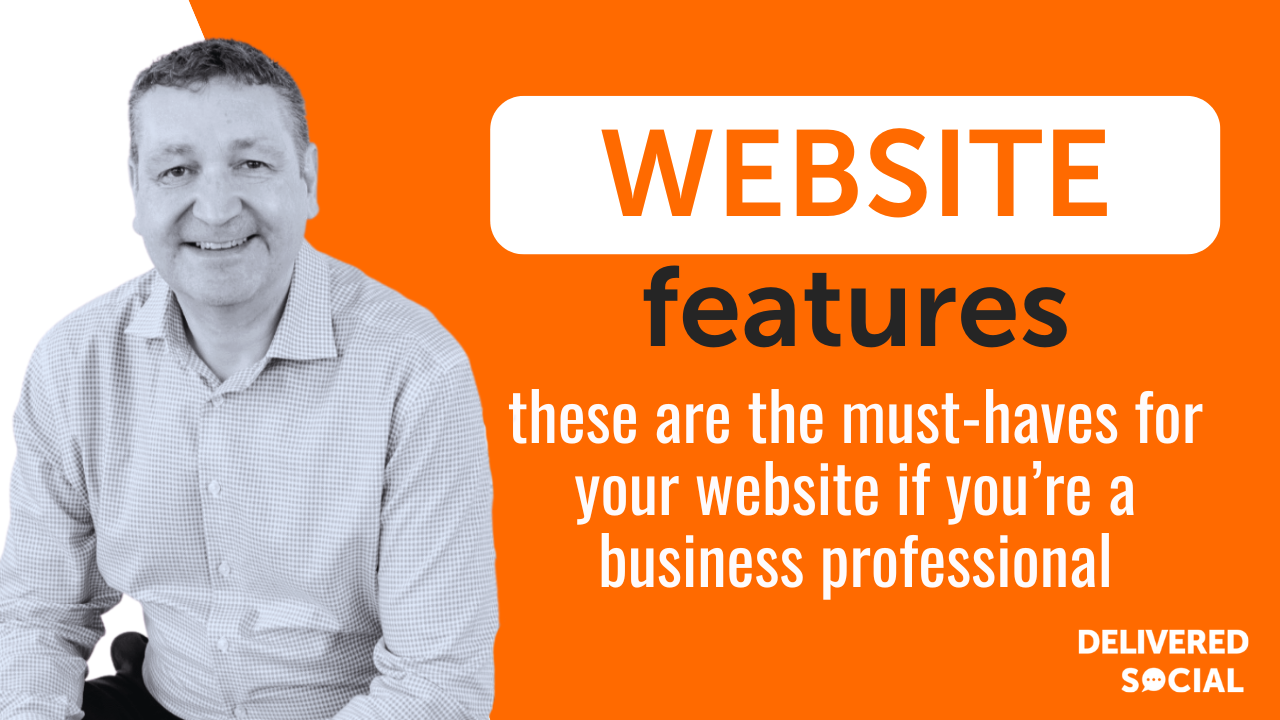
In today’s digital world, having a professional website is no longer optional, it’s essential. Whether you’re a consultant, lawyer, accountant, or any other industry expert, your website serves as your online storefront. It’s often the first impression potential clients get of you and your business. A poorly designed or outdated site can hurt credibility, reduce trust, and drive prospects away before they even consider working with you.
Websites for business professionals, if well structured, acts as more than just an online presence, it’s a marketing tool that attracts, informs, and converts visitors into clients. Unlike social media, which is controlled by platform algorithms, your website is a space you own, giving you full control over your brand’s message and visibility.
However, not all professional websites are created equal. A credible website isn’t just about looking good, it must be functional, user-friendly, and optimised for search engines. It should clearly communicate who you are, what you offer, and why potential clients should choose you over competitors. Additionally, factors such as site speed, security, and mobile responsiveness all play a role in how your audience perceives you.
This article will explore the must-have features of professional websites, why they matter, and how you can build a site that establishes trust and authority in your industry. Whether you’re creating a website from scratch or looking to improve an existing one, these key elements will help you stand out and make a lasting impression.
Next, let’s explore why business professionals need a website and the impact it has on branding, trust, and customer perception.
Why You Need Websites For Business Professionals
A strong web presence for business professionals is more important than ever. In an era where people research services online before making decisions, not having a website can make you invisible to potential clients. Even if you rely on word-of-mouth or social media, a professional website acts as your digital home, giving you credibility and control over your brand.
1. It’s Your Digital Business Card
A well-designed website allows potential clients to find essential information about you instantly. Unlike social media profiles, which follow a fixed format, a website gives you full flexibility to present yourself in the best way possible.
2. Builds Credibility and Trust
First impressions matter, and a sleek, professional website instantly reassures visitors that you are serious about your business. A well-structured site with client testimonials, case studies, and professional branding helps build trust and positions you as an expert in your industry.
3. You Control Your Online Presence
Relying on LinkedIn, Facebook, or other third-party platforms can be risky. Social media sites frequently change their algorithms and policies, affecting your visibility. With your own website, you own the platform, and you decide how your services are showcased.
4. A 24/7 Sales Tool
Unlike a physical office, your website is available around the clock. Visitors can browse your services, read your content, and make enquiries at any time, even outside of business hours.
5. Attracts Clients Through Search Engines
When optimised correctly, your website can appear on Google search results, allowing potential clients to find you organically. This is far more sustainable than relying solely on paid ads or social media marketing.
Next, we’ll explore the must-have features of a credible business website and how they impact user experience.
Must-Have Features for a Credible Company Website
Websites for business professionals isn’t just about looking good, it needs to establish trust, provide essential information, and encourage visitors to take action. Without the right features, even the most visually appealing site can fail to convert potential clients. Here are the must-have elements that every professional website should include.
1. Creative Design & Branding
Your website’s design is the first thing visitors notice. A clean, modern look with consistent branding (logos, colour schemes, and typography) enhances professionalism. If your site looks outdated or cluttered, visitors may question your credibility.
2. Clear & Engaging Homepage
Your homepage should immediately communicate who you are and what you do. A compelling headline, a brief description of your services, and an easy-to-navigate layout ensure visitors find the information they need without frustration.
3. Mobile Optimisation
More than 50% of web traffic comes from mobile devices, so if your website isn’t mobile-friendly, you’re losing potential clients. A responsive design ensures a seamless experience across smartphones, tablets, and desktops.
4. Fast Load Speeds
A slow website frustrates visitors and increases bounce rates. Aim for a load time of under three seconds by optimising images, minimising unnecessary scripts, and using reliable hosting.
5. Easy Navigation & Contact Information
Visitors should be able to find what they need in seconds. Use a simple menu structure, clear page headings, and a visible contact page with multiple ways to get in touch (email, phone, contact form).
6. Secure Domain Name
A domain like www.yourname.com looks far more professional than yourname.freewebsite.com. Also, an SSL certificate (HTTPS) is essential for security and trust.
7. Call-to-Action (CTA) Buttons
Your site should guide visitors toward taking action, whether it’s booking a consultation, signing up for a newsletter, or downloading a resource. Effective CTAs encourage conversions.
A well-designed website with these essential features not only looks professional but also builds trust and drives business growth.
Next, we’ll dive into content strategies that help engage visitors and establish authority in your industry.
Content That Builds Trust & Engagement
Having a professional-looking website is just the first step. The real key to converting visitors into clients is the content you provide. High-quality, informative, and engaging content helps establish authority, build trust, and encourage users to take action. When it comes to websites for business professionals, here’s what every website needs.
1. A Strong “About” Page
Your “About” page is one of the most visited sections of your site. It should go beyond a simple bio and explain:
- Who you are and what makes you an expert.
- Why clients should trust you.
- Your professional background, values, and approach.
Including a professional headshot and personal story helps humanise your brand and build trust.
2. Client Testimonials & Case Studies
Social proof is one of the most powerful ways to demonstrate credibility. Featuring real client testimonials and case studies showing how you’ve helped others makes your services more appealing. Authentic reviews reassure visitors that they’re making the right choice.
3. A Blog for Industry Insights & SEO
A regularly updated blog allows you to:
- Share expert knowledge and position yourself as a leader in your field.
- Improve SEO rankings, helping potential clients find you online.
- Provide valuable answers to common industry-related questions.
If blogging isn’t your strength, consider repurposing LinkedIn posts, case studies, or FAQs into blog content.
4. Strong Calls-to-Action (CTAs)
Visitors should always know what to do next. Effective CTAs guide them towards booking a consultation, subscribing to a newsletter, or making an inquiry. Use action-driven phrases like:
✔ “Schedule a Free Consultation”
✔ “Download Your Free Guide”
✔ “Get in Touch Today”
By incorporating these content strategies, you create a website that not only looks professional but actively builds trust and engagement.
Next, we’ll explore the importance of SEO and security in our article, and how this impacts your visibility on Google.

SEO & Security: The Foundations of a Great Website
Websites for business professionals isn’t just about design and content, it also needs to be searchable and secure. Without proper SEO, potential clients won’t find you. Without security, visitors may not trust your site. Here’s how to ensure your website is both visible and credible.
1. SEO: Getting Found on Google
Search Engine Optimisation (SEO) helps your website rank on Google so potential clients can find your services. Here’s what you need to focus on:
- Keyword Optimisation – Naturally include relevant search terms throughout your site, especially in headlines and blog posts.
- Meta Titles & Descriptions – These appear in search results and should clearly describe your services.
- Internal & External Links – Linking to relevant pages on your site improves navigation and credibility.
- Mobile-Friendly Design – Google prioritises websites that work well on all devices.
Without SEO, even the best-designed site can remain invisible to potential clients.
2. Security & Trust Signals
Website security isn’t just for eCommerce stores, any website for business professionals needs to protect user data and ensure credibility. Key security features include:
- SSL Certificates (HTTPS) – Encrypts data and reassures visitors that your site is secure.
- Regular Software & Plugin Updates – If you use WordPress or other CMS platforms, outdated plugins can create vulnerabilities.
- Privacy Policy & Terms of Service – Demonstrates transparency and builds trust with visitors.
Google also prioritises secure websites in search rankings, meaning security doesn’t just protect your site—it boosts visibility.
By investing in SEO and security, you ensure that your website is both easy to find and safe to use.
Next, we’ll answer common questions about websites for business professionals websites and what business owners should prioritise.
Frequently Asked Questions (FAQs)
1. Do companies really need a website?
Yes. A website acts as your digital storefront, making it easier for potential clients to find you, learn about your services, and contact you. Without a website, you’re likely missing out on business opportunities.
2. How much does it cost to build a great website?
The cost varies depending on design, features, and hosting. A basic site can cost a few hundred pounds, while a fully customised, SEO-optimised website may run into the thousands. Many professionals opt for platforms like WordPress or Webflow for flexibility.
3. What are the must-have features for a great website?
A credible website should include:
✔ A professional design
✔ Clear branding & messaging
✔ Mobile responsiveness
✔ SEO-optimised content
✔ Secure hosting & SSL certification
4. How do I improve my website’s search ranking?
Focus on SEO best practices, including keyword optimisation, fast load speeds, high-quality content, and getting backlinks from reputable sources.
5. How often should I update my website?
Regular updates keep your site relevant and secure. Refreshing content, updating software, and adding new blog posts at least once a month helps maintain engagement and improve rankings.
A well-maintained website for business professionals is a key investment in long-term success.
Interested In Working Together?
Introducing Delivered Social. We’re The Most-Rated Digital Agency In Surrey & Hampshire – We’ve Got To Be Doing Something Right.
Delivered Social is a digital marketing agency with one mission—to help businesses grow. We’re famous in Guildford and Portsmouth for our social clinics. We believe in free advice. We build lasting relationships because our team prides itself on being helpful, which our clients appreciate.
If you are looking for a new website or an agency to manage your social media presence, we can help.
If you need something slightly different, here's a super handy list of all our services, or you can always email us.




















